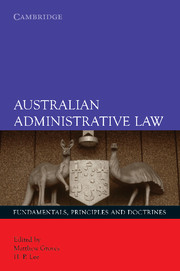Book contents
- Frontmatter
- Contents
- Foreword
- Preface
- About the contributors
- Table of cases
- Table of statutes
- 1 Australian administrative law: The constitutional and legal matrix
- 2 Administrative law in Australia: Themes and values
- 3 The public/private distinction in Australian administrative law
- 4 Australian administrative law: The human rights dimension
- 5 Administrative tribunals
- 6 Australian Ombudsman: A continual work in progress
- 7 Freedom of information
- 8 Delegated legislation
- 9 The concept of ‘justiciability’ in administrative law
- 10 Standing
- 11 Reasons for administrative decisions: Legal framework and reform
- 12 Relevant and irrelevant considerations
- 13 Improper purpose
- 14 Reasonableness, rationality and proportionality
- 15 The ‘no evidence’ rule
- 16 Failure to exercise discretion or perform duties
- 17 Procedural fairness: The hearing rule
- 18 The doctrine of substantive unfairness and the review of substantive legitimate expectations
- 19 The impact and significance of Teoh and Lam
- 20 The rule against bias
- 21 Jurisdictional error without the tears
- 22 Privative clauses and the limits of the law
- 23 Administrative law judicial remedies
- Endnotes
- Index
7 - Freedom of information
Published online by Cambridge University Press: 05 June 2012
- Frontmatter
- Contents
- Foreword
- Preface
- About the contributors
- Table of cases
- Table of statutes
- 1 Australian administrative law: The constitutional and legal matrix
- 2 Administrative law in Australia: Themes and values
- 3 The public/private distinction in Australian administrative law
- 4 Australian administrative law: The human rights dimension
- 5 Administrative tribunals
- 6 Australian Ombudsman: A continual work in progress
- 7 Freedom of information
- 8 Delegated legislation
- 9 The concept of ‘justiciability’ in administrative law
- 10 Standing
- 11 Reasons for administrative decisions: Legal framework and reform
- 12 Relevant and irrelevant considerations
- 13 Improper purpose
- 14 Reasonableness, rationality and proportionality
- 15 The ‘no evidence’ rule
- 16 Failure to exercise discretion or perform duties
- 17 Procedural fairness: The hearing rule
- 18 The doctrine of substantive unfairness and the review of substantive legitimate expectations
- 19 The impact and significance of Teoh and Lam
- 20 The rule against bias
- 21 Jurisdictional error without the tears
- 22 Privative clauses and the limits of the law
- 23 Administrative law judicial remedies
- Endnotes
- Index
Summary
Judicial review and responsible government both have an important role to play in ensuring legality and accountability in executive decision-making. Freedom of Information (FOI) laws enhance the operation of those mechanisms while supplementing them with a more direct form of accountability to the people. They also make a substantial contribution to information privacy by providing an avenue for access to, and amendment of, personal records held by governmental agencies.
This chapter is concerned exclusively with FOI laws. Other laws which provide alternative sources of access to public sector information include information privacy and health records statutes, public records statutes, requirements for administrative decision makers to provide reasons for their decisions (see Chapter 11), other common law duties of disclosure and laws which require the proactive disclosure of information, including information about government contracts.
The concept of a statutory right of access to information originated in Sweden in the seventeenth century, but first attracted attention in Australia following the enactment of the FOI legislation in the United States in 1967.
The Freedom of Information Act 1982 (Cth) (the Commonwealth FOI Act), which will form the main subject of this chapter, formed the final element of the Commonwealth's so called ‘New Administrative Law’ package and is confined in its operation to the Commonwealth public sector. It was the first national legislation to be adopted by a country with a Westminster-style system of government and had its origins in a commitment by the Whitlam Labor government in 1972 to enact legislation along the lines of the United States legislation, although its enactment was delayed until 1982 while it was considered by a number of government bodies.
- Type
- Chapter
- Information
- Australian Administrative LawFundamentals, Principles and Doctrines, pp. 116 - 133Publisher: Cambridge University PressPrint publication year: 2007
- 1
- Cited by



